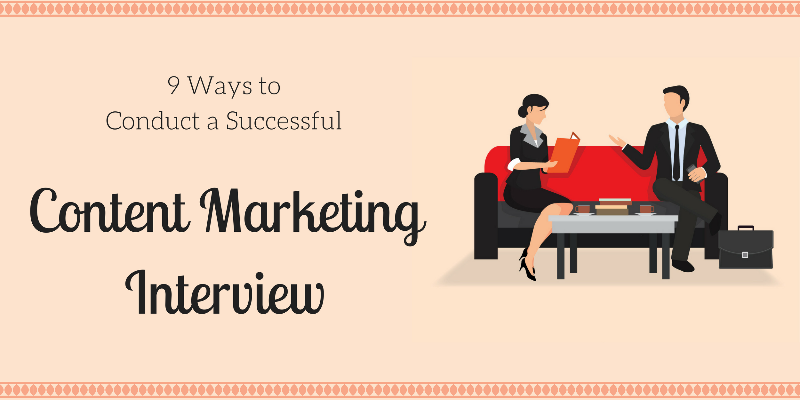Professional interviewers are the artisans of journalism. They possess the knowledge and skills to lead real-time conversations and obtain valuable information even from the most inaccessible interviewees. They have the power to balance between aggressive questioning and peaceful listening. They have the talent but also a strong work ethic. And most importantly, they prepare thoroughly for each interview.
If you, as a content marketer want to achieve the same level of expertise as these professionals, you have to be ready to invest a lot of time and effort in training. You will also need a good interview strategy and we are here to help you with that.
In this article, we will show you 9 tactics to make a perfect interview preparation. These suggestions will help you as the digital marketer to interview someone in your niche. You can publish it on blog or make a podcast, and get a high-quality content consequently.
This is extremely important because more than 60% of content marketers claim that their top challenge is to produce engaging content. The reason is simple – readers are tired of old news and boring articles. They demand more appealing content and one way to indulge them is by publishing interesting interviews in the form of blogs, podcasts or even live videos.
Interviews with key opinion leaders in your industry are a great way to earn extra attention from your followers. However, a sheer presence of niche experts on your webpage is not a guarantee of user satisfaction and engagement. On the contrary, interviews have to be exciting and provide readers with new information or mind-provoking conclusions. This is something that you cannot achieve without excellent interview preparations.
Bearing in mind that you ought to interview industry opinion leaders, preparations become even more important. You can’t ask them superficial questions. Instead, you need to dig deeply into all topics to add value to their answers but also use interviewing techniques like persistence or pace changing to get the most out of your guests. Therefore, if you master the art of interviewing, you can make the discussions more interesting and improve the overall quality of your digital content.
Things to Do While Conducting an Interview
There are hundreds of more or less small suggestions that we can give you about interview preparations. However, there are a few essentials that you need to keep in mind on all occasions. Here, we will explain to you the 9 most important tactics in that regard.
Make a plan
Before you meet an interviewee, you should make a good plan to cover all details of your discussion. First of all, think about the venue – is that small coffee shop really a good place to meet the government official? Details like this can seal the faith of your interview before it even begins.
Secondly, you should know the goal of your interview. What do you want to find out? Do you want to hear a nice story or the breaking news? Your entire plan depends on answers to these questions, so don’t forget to make a plan. There are no excuses. After all, journalists know that you can prepare even for the spontaneous interviews.
Check the facts
Once you’ve made a plan, you need to make sure that you know the facts about the interviewee and the topics you want to discuss. The list of fact checking themes depends on the nature of the business but we suggest you always check twice before mentioning any names, dates, figures, etc. For instance, it would be extremely awkward to ask Michael Jordan about the number of NBA titles he has won. Okay, this is a very simple example but you get our point – fact checking is mandatory.
Break the ice
Some people find it confusing to meet and open up to strangers. This is not the case with experienced businessmen or politicians but it’s common among other people. That’s why you need to break the ice and play the game smoothly in the beginning. Introduce yourself and try to be friendly. This is usually enough to make interviewees more comfortable.
On the other hand, you could meet a very talkative person. In this case, you should stay in charge of your conversation and don’t let your plan fall apart because you are not able to stop the interlocutor. Just stay focused and keep reminding an interviewee to answer your question. This is the only way to make a good interview with a chatty individual.
Ask the right kind of questions
Questions are the core of your interview, so you need to know which ones to use. There are all sorts of different questions but here are the most popular interviewing choices:
- Straightforward: As a journalist, you need to be direct and receive precise answers to the questions. Using straightforward inquiries, you’ll leave no choice to the interviewee but to answer you directly.
- Brief: Direct responses come from brief questions. If you have complex questions on your list, try to divide them into a series of shorter and simpler queries. If not, you will probably make the person in front of you confused and you’ll get blurry answers.
- Open-ended: If you ask someone if they had lunch today, they will probably answer you with ‘Yes’ or ‘No’. This type of question is closed-ended and it will hardly ever get you good answers. Instead, you should use open-ended questions to get more interesting responses. For instance, you will ask ‘How was your lunch today?’ The answer could be anything but it won’t be ‘Yes’ or ‘No’.
- Intrusive: If you are talking to the person who avoids giving concrete answers, you have the right to be intrusive and cut the long story short by demanding additional explanations.
- Soft: Soft questions are ice-breakers that you will probably use at the beginning of an interview to make people more relaxed and prepared for more problematic inquiries. But if you are facing a serious media professional (a movie star or a politician), soft questions will most likely be useless. According to the Centre for Investigative Journalism, they have probably done this many times before, time is precious, and if they want to avoid the question they will.
We have a bonus tip here – always write down your questions. We are all humans, we all make mistakes and forget about things, so we cannot keep the same level of concentration constantly. In cases like this, it’s better to have your questions on paper.
Want Help With Your Content Marketing?
 The 3 Pillars Guide Will Get You Focused on The Right Things - At The Right Time. Enter your email address to get it now
The 3 Pillars Guide Will Get You Focused on The Right Things - At The Right Time. Enter your email address to get it now
Focus on activities
A lot of interviewees want to seize the moment and talk about everything they ever felt or experienced. The theory is alright if you are running a science magazine but in almost all other cases it will only chase away your followers. Your job is to guide interviewees through conversations and allow them to speak about concrete actions, events, or situations. It makes the story more appealing and exciting, which is the best way to grab readers’ attention.
Change the rhythm
Monotony is boring and you need to change the rhythm of an interview to make it sound interesting. Don’t let the interlocutor talk for 20 minutes without a pause. You should change the pace by asking sudden and direct questions, the tactic often used by the BBC’s interviewer Jeremy Paxman. Only in case you are interviewing an extremely amusing person with excellent storytelling skills, you should allow him/her to take charge and talk without interruptions.
Enjoy the silence
Every journalist knows that awkward feeling when an interviewee doesn’t want to answer a question and remains silent. Although inconvenient, you should learn to embrace moments like this and enjoy the feeling. After all, you asked a simple question and it would be unwise to go over it just like that. Therefore, you shouldn’t move on to the next question but rather wait for the interviewee to crack and give you the answer you’ve been looking for. It’s a battle of nerves that you don’t want to lose, so learn how to enjoy the silence.
Be persistent
Successful interviewers accept nothing but relevant answers. If the person sitting in front of you is neglecting your questions and giving you superficial feedback, you should stay persistent. Ask for additional explanations. If that doesn’t work, ask the same question in a slightly different form. And then ask again. Even the most experienced interlocutors will break after a series of direct questions. But even if they don’t break, you definitely exposed their intention to avoid difficult topics, which pretty much speaks for itself.
Listen carefully
Now that you’ve seen all sorts of ways to get the best out of your interviewees, you should also learn how to listen to what they are telling you. If you are receiving good feedback, don’t interrupt and pay attention. This way, you show respect towards your guest and confirm journalistic professionalism. At the same time, you can use the answers you get to expand discussions and make an interview even more interesting than planned.
Conclusion
Conducting an interview may seem like a simple process from the outside but professional journalists know how difficult it is to get meaningful answers from all interviewees. If you want to learn how to lead interviews successfully, you need to understand basic principles of journalism. In this article, we revealed 9 tactics to make a perfect interview preparation. Don’t hesitate to use our tips and let us know in comments if you have other valuable suggestions to share with our readers.
About the author:
Karen Dikson is a blogger and Digital Marketing Manager at BestEssays. She is an intuitive and creative thinker who is able to connect various thoughts into a single theme. Karen loves to stay up to date on the latest digital trends. Her works have been published on HuffPost and other business resources. Connect with Karen on Twitter.



